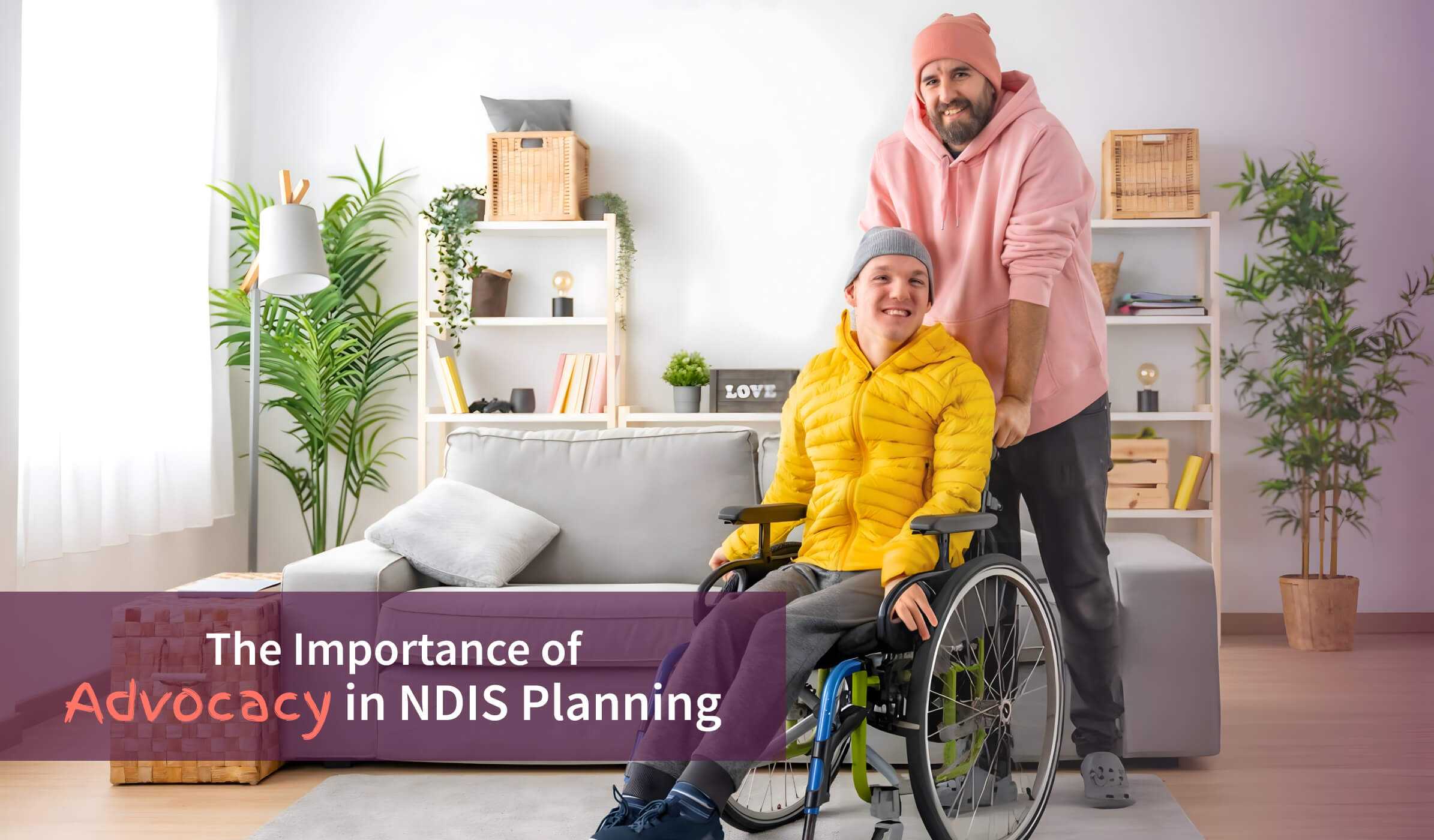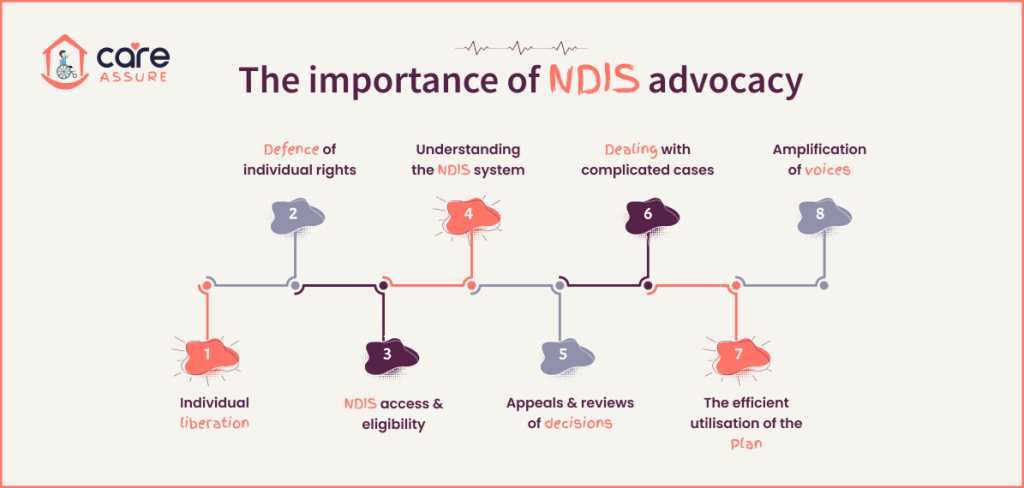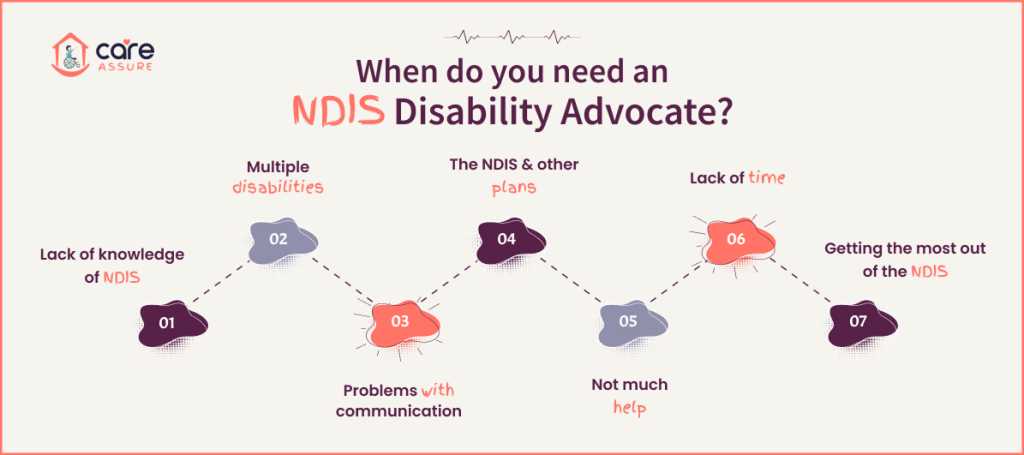The Importance of Advocacy in NDIS Planning
June 13, 2024
|By Careassure
|11 min read

Although the National Disability Insurance Scheme (NDIS) intends to provide individuals with disabilities with increased flexibility and control, advocacy remains as vital as ever. The reason for this is that power is still primarily held by the organisations responsible for enacting change, including the government, the bureaucracy, and agencies that offer services to the public. It is necessary to engage in vigorous advocacy to ensure that the perspectives and goals of those individuals, namely your family members who are disabled and who will be most affected by these changes, are heard and that action is made in response to them. In that case, choices will continue to be made on their behalf throughout the process.
What is NDIS Advocacy?
Advocates for people with disabilities are those who take action, speak out or write to promote, protect, and defend the rights of people who have disabilities. An individual who is not affiliated with the National Disability Insurance Agency, the Commission, or any NDIS providers who provide support or services to individuals with disabilities is considered an advocate for those with disabilities. Our goal is to eliminate any potential conflicts of interest. Advocacy assists individuals with disabilities who are confronted with complicated challenges, those who are unable to advocate for themselves, or individuals who do not have family members, friends, or peers who can provide them with informal support. Advocates for people with disabilities can advocate for themselves, another individual or group, or both to guarantee that the person they are helping can keep their choice and control and that their voice is heard.
What is the National Disability Advocacy Program in Australia?
People with disabilities can get help from the National Disability Advocacy Programme (NDAP), which promotes and protects their fair and full enjoyment of all human rights. People with disabilities, their families, and people who care for them can use the Disability Support Finder to find support groups that the Federal Government funds, as well as the State and Territory Governments. You can get general access and help from the National Disability Advocacy Programme. It also helps disabled people with other problems that might come up, like getting help with the National Disability Insurance Scheme.
The main goal of the National Disability Advocacy Programme is to protect, promote, and support the rights of disabled people. Its job is to "act in a partisan manner" and "ensure duty of care at all times." It takes into account the fact that as a person who uses disability services, you are more likely to have a problem or two the more people and companies you interact with. Along with it came the need for help solving these issues. This programme for disability advocacy stands with you and your cause as a person. It says that you have the same rights as everyone else. It gives the overall support that makes problem-solving possible in several ways.
The importance of NDIS Advocacy
Advocacy has been proven to greatly help people with disabilities. Here are the top importance participants can get.

1. Individual liberation
Advocating for someone allows them to exercise choice and control over their life by ensuring they have access to the information and tools they require to make informed decisions.2. Defence of individual rights
Advocates play an important role in protecting individuals' rights and ensuring that they are not exposed to discrimination, neglect, or abuse. The individual's well-being is always prioritised, and they serve as a buffer against any potential problems that may arise.3. NDIS access and eligibility
The fulfilment of the qualifying requirements is one of the most significant challenges faced by people with disabilities looking for assistance through the NDIS. Through the process of gathering pertinent documentation and making a compelling argument to the NDIS to gain access to financing and services, an advocate for the NDIS plays a critical role. When a participant has been denied entrance to the National Disability Insurance Scheme (NDIS), an advocate can assist. The amount of aid that a person with a disability receives may be impacted if they are denied funding from the National Disability Insurance Scheme (NDIS) or if their appeal is delayed. In the case of Toby Tyne, who was denied assistance from the National Disability Insurance Scheme (NDIS), his condition continued to deteriorate.4. Understanding the NDIS system
For participants and their families, the National Disability Insurance Scheme (NDIS) system can be challenging to understand because it involves a variety of details, paperwork, and deadlines. Advocates for the National Disability Insurance Scheme are available to help you know what is involved and ensure that you know all the opportunities and options available.5. Appeals and reviews of decisions
Sometimes, applying for the National Disability Insurance Scheme (NDIS) is turned down, or the authorised plan does not adequately fulfil the participant's requirements. Disability advocates can assist in the preparation of appeals and assist participants in the submission of plan reviews to prioritise the essential supports and service providers for people with disabilities.6. Dealing with complicated cases
In certain situations, medical and legal issues are pretty complicated, making navigating the NDIS system rather challenging. This support can be made more efficient with the assistance of a disability advocate, who offers vital expertise and support. In addition, they work together with other individuals, such as occupational therapists and support coordinators, to guarantee that the participant's rights are addressed thoroughly.7. The efficient utilisation of the plan
By ensuring that participants have a complete understanding of their NDIS plans, advocates make it possible for participants to make the most efficient and effective use of the available resources.8. Amplification of voices
For many people, it might be difficult to articulate their wants, concerns, and goals for themselves. Advocates contribute to amplifying these voices, ensuring that the appropriate authorities can hear them.When do you need an NDIS Disability Advocate?
How much help you need from an NDIS supporter depends on your situation. Some people are sure they can handle the process on their own, but others need extra help because they have a disability, don't have any informal support, or have trouble communicating. Sometimes, getting help from a disability supporter is a good idea.

1. Lack of knowledge of NDIS
People new to the NDIS may find it hard to understand how it works and what the terms mean. Working with a disability supporter makes the information clearer and easier to understand so everyone knows their rights and choices.2. Multiple disabilities
People with many different needs may need expert help from a disability advocate who knows how to meet those needs.3. Problems with communication
Participants who have trouble communicating may need help telling a disability service provider what they need. An advocate works as a go-between to make sure that the participant's needs and wants are heard.4. The NDIS and other plans
When there are disagreements with the NDIS about money, services, or how the plan is divided, an advocate can act as a go-between. They work for the participant to find answers that are fair and work for everyone.5. Not much help
Someone with a disability who doesn't have a lot of personal support may need a disability advocate to help them and show them the way.6. Lack of time
It takes a lot of time and energy to figure out how to use the NDIS. Hiring a defender takes away some of the stress and pressure that comes with the review and appeals process.7. Getting the most out of the NDIS
An advocate will help you learn about the available NDIS services and supports to ensure you get the most out of the benefits you are entitled to.How do you get a disability Advocate?
The Disability Advocacy Finder helps NDIS participants find advocates to help them deal with problems in the NDIS system. The National Disability Advocacy Programme (NDAP) works to give people with disabilities access to good advocacy, which helps to promote, protect, and use rights and community involvement. A disability advocate will still be helpful to you as you go through the NDIS. Their knowledge and care can make you feel better, whether it's about figuring out your status, going through reviews and appeals, or protecting your rights.
Conclusion
It is very important to speak up for people whose rights might be forgotten or dismissed. A lot of the time, advocates are the only outside help that people get during some of the hardest times in their lives. That's why we need to keep promoting advocacy services all over the country. People who are in the hospital often don't know what their rights are and feel lost, confused, and scared. People who feel like they don't have control over their care and treatment can find information and self-help tools very helpful. We can stop more people from having to go through abuse and neglect if we work together. We can help people live the lives they want if we work together. Care Assure is a registered NDIS service that supports advocacy so that you have control over the decisions that are made for you. If you or someone you care about needs personalised disability support, please contact us today.
Frequently Asked Questions (FAQs)
Advocacy gives specialised support adapted to the unique needs and situations of individuals. Advocates help people prepare for planning sessions, comprehend NDIS language, and interpret assessment results. They assist individuals in expressing their goals and aspirations, ensuring that plans represent their requirements and preferences. Advocates can also contest decisions or negotiate on behalf of clients to get the necessary resources.




